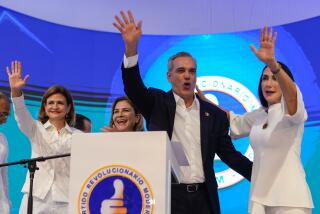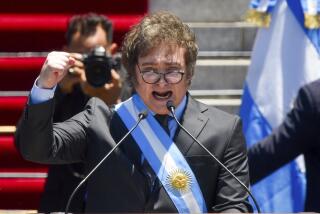Alfonsin Rebounds from Election Defeats
BUENOS AIRES — President Raul Alfonsin was distressed and discouraged after his party took a beating in Argentina’s congressional and provincial elections in September. Officials denied rumors that he was thinking of resigning, but it was clear that the president’s spirits were low.
Now, political analysts say, Alfonsin’s darkest moment has passed, and he is facing the formidable problems of his administration with renewed buoyancy.
In a recent press conference, the 60-year-old Alfonsin appeared more cheerful and confident than he had since the elections, observers said.
“He came across as very vigorous, very restored,” said a communications analyst.
“I see him recovering his confidence,” a foreign diplomat said.
But the diplomat and other political analysts said the president, who has two years remaining in his term, will continue to miss the high popularity and prestige that enhanced his power in the first years of his government.
“For somebody who has lost that total power, and is probably realizing that he is a lame duck, this is a hell of a change,” the diplomat said. “It’s going to be much more difficult for him.”
Alfonsin was hailed as a democratic hero when he took office on Dec. 10, 1983, after winning an electoral landslide. Succeeding an unpopular military government, his administration enjoyed overwhelming public support.
But this year, economic problems brought a surge of inflation that rapidly withered the purchasing power of wages. And at the same time, a wave of military unrest persuaded Alfonsin and the Congress to approve an amnesty for hundreds of officers accused of serious human rights abuses.
Both the inflation and the amnesty raised storms of criticism during campaigning for the Sept. 6 elections. Alfonsin’s centrist Radical Civic Union lost its majority in the lower house of Congress, the Chamber of Deputies, which had been a buttress for his ambitious government programs.
Even before the elections, the Radicals lacked a majority in the Senate, so when the next Congress convenes Dec. 10, Alfonsin will be forced to seek support outside his party in both houses.
The elections left the Radicals with only two of 22 provincial governorships. The big winner was Antonio Cafiero, a leader of the Peronist Party who won the governorship of Buenos Aires province, the area adjacent to the capital and by far the most populous of the 22 provinces.
Gustavo Caravallo, a Peronist lawyer and close adviser to Cafiero, said Alfonsin considered offering his resignation to the Congress.
“We know that he was very depressed after the election,” Caravallo said. “We know that he wanted to resign--not formally, but just to submit his resignation to the Parliament.”
Some members of Congress discouraged the president from doing that, Caravallo said in an interview.
In a separate interview, Vice President Victor Martinez denied that Alfonsin considered resigning. “No one thought the electoral blow of Sept. 6 would be so big, but in no way did the president think of resigning,” Martinez said.
He added that the election defeat has resulted in “self-criticism” by the government and in increased determination to control the federal deficit, which is a major contributor to inflation.
The government has submitted a bill that would impose a series of tax increases, which are opposed by both business and labor. The labor-based Peronist party has said it will oppose most provisions of the bill.
In mid-October, Alfonsin decreed a freeze on prices and wages in an attempt to control inflation, which raged at a monthly rate of nearly 10%.
Labor unions, complaining that the price-freeze is not working and demanding wage increases, have scheduled a 36-hour general strike for next Thursday and Friday.
More to Read
Sign up for Essential California
The most important California stories and recommendations in your inbox every morning.
You may occasionally receive promotional content from the Los Angeles Times.










